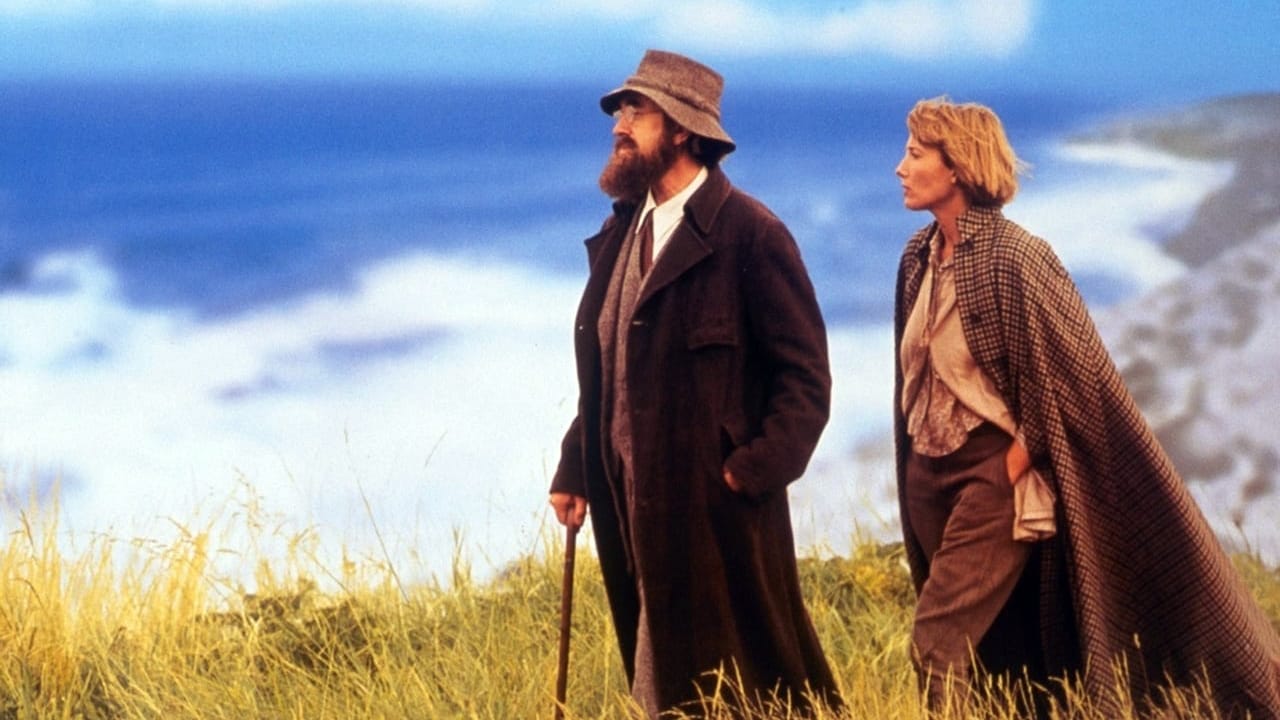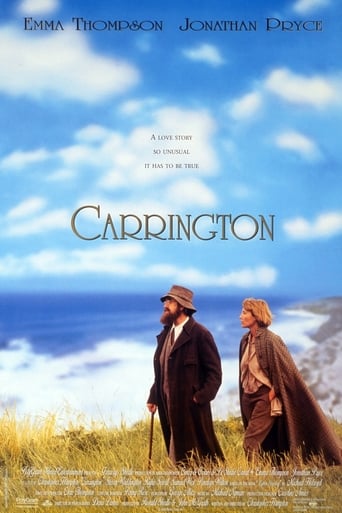

With talented actors forming the cast, having an interest in fact-based dramas and with a remarkable story of a very interesting platonic romance between Dora Carrington and Lytton Strachey, 'Carrington' had a lot going for it. Luckily, 'Carrington' didn't waste its potential and the result is an outstanding, beautiful and near-flawless film. Let down only on a few character motivations not quite being as clear as they could have been. Clocking in at just under two hours and with a fairly deliberate pace, 'Carrington' was never dull to me regardless. Due to being captivated by the acting performances, the beautiful and intense way the central relationship was handled and the emotional impact. Jonathan Pryce has never been better and gives the performance of a lifetime. Emma Thompson's performance is one of her best and most captivating. The two have a lovely chemistry, part playful, part ambiguous, part intense and part poignant. The rest of the cast, which includes Penelope Wilton and Samuel West, are similarly splendid, but it's the two leads that particularly shine.'Carrington' is a very handsome-looking film, sumptuously and evocatively designed and costumed and clearly filmed with a lot of love and care. The music is understated but has enough presence to not make it too low-key. Script is witty and thought-provoking, the story always compels thanks to the central relationship anchoring the drama being so beautifully written and played. Also haven't seen first-time direction this intelligent or sympathetic in quite some time either. Overall, outstanding. 9/10 Bethany Cox
... View MoreNo, this is not a biopic of Margaret Thatcher's Foreign Secretary who resigned over the Falklands War. Dora Carrington (1893–1932) was an English painter who was associated with the Bloomsbury Group, a group of British artists, writers and intellectuals who took their name from the district of North London in which many of them lived. Many of the Bloomsburies were believers in "free love", and they were known for their complex sex lives which have provided fertile material for biographers ever since. Carrington (she preferred to be known simply by her surname) was no exception; in fact the real Carrington had an even more complicated sex life than the character portrayed in this film. Here she is shown as exclusively heterosexual, whereas in reality she was bisexual and had affairs with both men and women. The men in her life depicted here are her fellow-artist Mark Gertler, her husband Ralph Partridge, the writer Gerald Brenan and her great love, the author and critic Lytton Strachey.It seems odd to say that Strachey was the great love of Carrington's life because he was famously homosexual. She, however, became obsessed with him, and the two began an unusual relationship. It was never consummated in a physical sense, although they slept together in the same bed, but their friendship continued until the end of Strachey's life, throughout Carrington's marriage to Partridge and her affairs with other men. Not long after he died, the grief-stricken Carrington committed suicide. The relationship was further complicated by the fact that Strachey was himself sexually attracted to some of Carrington's other lovers, especially Partridge. (The question of whether Strachey and Partridge actually had a physical relationship is discreetly left unanswered in the film). The film's main strength is the quality of the acting, especially from Emma Thompson in the title role and Jonathan Pryce (hidden behind a beard like a quickset hedge) as Strachey. As played by Pryce, Strachey comes across as conceited and self-obsessed, yet also capable of dignity and sincerity, especially when, as a conscientious objector during the Great War, he has to defend his pacifist position before a conscription board. He fails to return Carrington's selfless devotion, but we are always aware that, because of his sexuality, this is not something for which he can be blamed. Despite her tangled love-life, Carrington comes across as surprisingly naive and innocent. She was only in her early twenties when she first met Strachey, whereas Thompson was in her mid- thirties at the time the film was made, yet we are never conscious of watching an older woman playing a younger one. Another good feature is the visual appearance of the film, with some attractive photography of the English countryside in the outdoor scenes. The indoor ones are rather lighter and airier than is normal in British "heritage cinema", owing to the distinctive Bloomsbury ethic, based around pastel colours and simplicity at a time when interior design in Britain was generally marked by strong colours and elaborate decoration. The film, written and directed by Christopher Hampton, focuses mainly on Carrington's sexual and romantic relationships. The film is divided into six chapters, and it is significant that all but one of these feature a man's name in the title; none of these titles makes any reference to her art. Although the film helped to revive interest in Carrington, previously somewhat neglected, as an artist, little of her art is featured here. Perhaps the reason is that the Bloomsbury Group, generally progressive in other matters, were rather conservative when it came to the visual arts; like Vanessa Bell and Duncan Grant, Carrington was more influenced by the French Impressionists and Post-Impressionists of a previous generation than by her Modernist contemporaries. The one picture that does play an important role is Gertler's "Merry-Go-Round", an allegory of the First World War and far more daringly radical than anything Carrington ever produced. Yet Carrington was clearly a talented artist, and I would have preferred it if the film had explored this aspect of her life in greater depth, particularly as I am one of those who believe that the study of lesser- known artists can be as rewarding as that of the officially recognised Big Names. This is especially true of the twentieth century, the artistic history of which has far too often been portrayed as a steady progression towards the inevitable triumph of abstract over figurative art. The contribution of those like Carrington who stood for a quite different set of artistic values has tended to be neglected. There was more to her than simply being the female participant in a rather unusual (even by Bloomsbury standards) love affair. 6/10
... View MoreBiography and history are not well represented among great film productions, one can sense that most film makers prefer to allow their imaginations free rein and avoid any factual constraints. But I always enjoy good biographies, whether in the form of books or films, and for me Carrington is a delightful film to be both savoured and treasured.However London was home to the so-called Bloomsbury group so they became best known in the U.K., and this film would be more readily appreciated there than in North America. The group consisted mainly of the leisured and fairly well to do junior offspring of aristocratic families who were able to spend almost all their time actively participating in the worlds of literature, drama or the arts. Its members were unusual in being very contemptuous of the contemporary moral code, whilst still having strong moral scruples that essentially governed all their actions. World War 1 occurred during the period when they had their greatest influence on British society, and many members of the group became infamous for being conscientious objectors to participating in the war on ethical rather than religious grounds. Sexually they had very progressive attitudes, and generalizing to perhaps a dangerous extent, they viewed personal commitments which had to be preserved as all important, but believed these commitments were made between the individuals concerned and were no business of either the Church or the State.Featured in this film are Emily Carrington and Lytton Strachey. She was a very well regarded artist who seemed to have some repugnance about exhibiting or selling her works in the usual way. He was essentially an essayist who achieved both fame and success with the publication of "Eminent Victorians" - a book of condensed biographies, many only a few paragraphs long but all showing considerable ability to pick out the key character traits that ultimately contributed most to the public image of the individuals concerned. Both are played (by Emma Thompson and Jonathan Pryce) with remarkable depth and sincerity.These brief comments may help anyone who has read little of the characters involved to understand why the film is of real interest to so many older viewers; they can do nothing to convey the charm and yet knife sharp precision it shows in displaying the activities of its principal protagonists. I find it hard to assess how far their activities might become of interest to younger viewers who have no familiarity with the period, purely on the strength of this film. I can however assure those who do not share my background that I found the film not only truly fascinating but also an immensely satisfying viewing experience. Usually, if a film biography causes me to look out for the book on which it was based, this is an indication that the film did not really succeed,; but not so on this occasion when I just felt the urge to enjoy more of the fascinating story.I rate this film at eight stars on the IMDb scale - if I had felt it would have a more universal appeal this would have probably been nine. In what they attempted to do its makers have shown near genius, and both the cinematography and acting are almost above reproach. Today I suspect that some will find it boring, but I believe they will be far fewer than might be expected from the subject matter - this is a prime example of one of the very few outstanding film biographies where a viewer almost feels he or she has got to know the actual characters being portrayed..
... View MoreCarrington is directed by Christopher Hampton, is based on the book by Michael Holroyd and stars Emma Thompson, Jonathan Pryce, Jeremy Northam and Samuel West.This powerful and deeply moving true story has a superb cast,beautiful locations,beautiful music and shows that love can be painful at times.Young painter Dora Carrington(Emma Thompson)is introduced to famous Victorian bohemian Lytton Strachy(Jonathon Pryce), he is a homosexual who at first thinks Carrington is a man(she has really short hair and wears mens clothes and he first sees only her back).The two become friends and Dora later falls in love with him and is heartbroken because they could never become a couple. The acting in this is stunning especially from Jonathan who bears a striking resemblance to Strachy and is just excellent in the part. A beautiful story of human frailty,struggles and triumphs and an unforgettable love story.
... View More